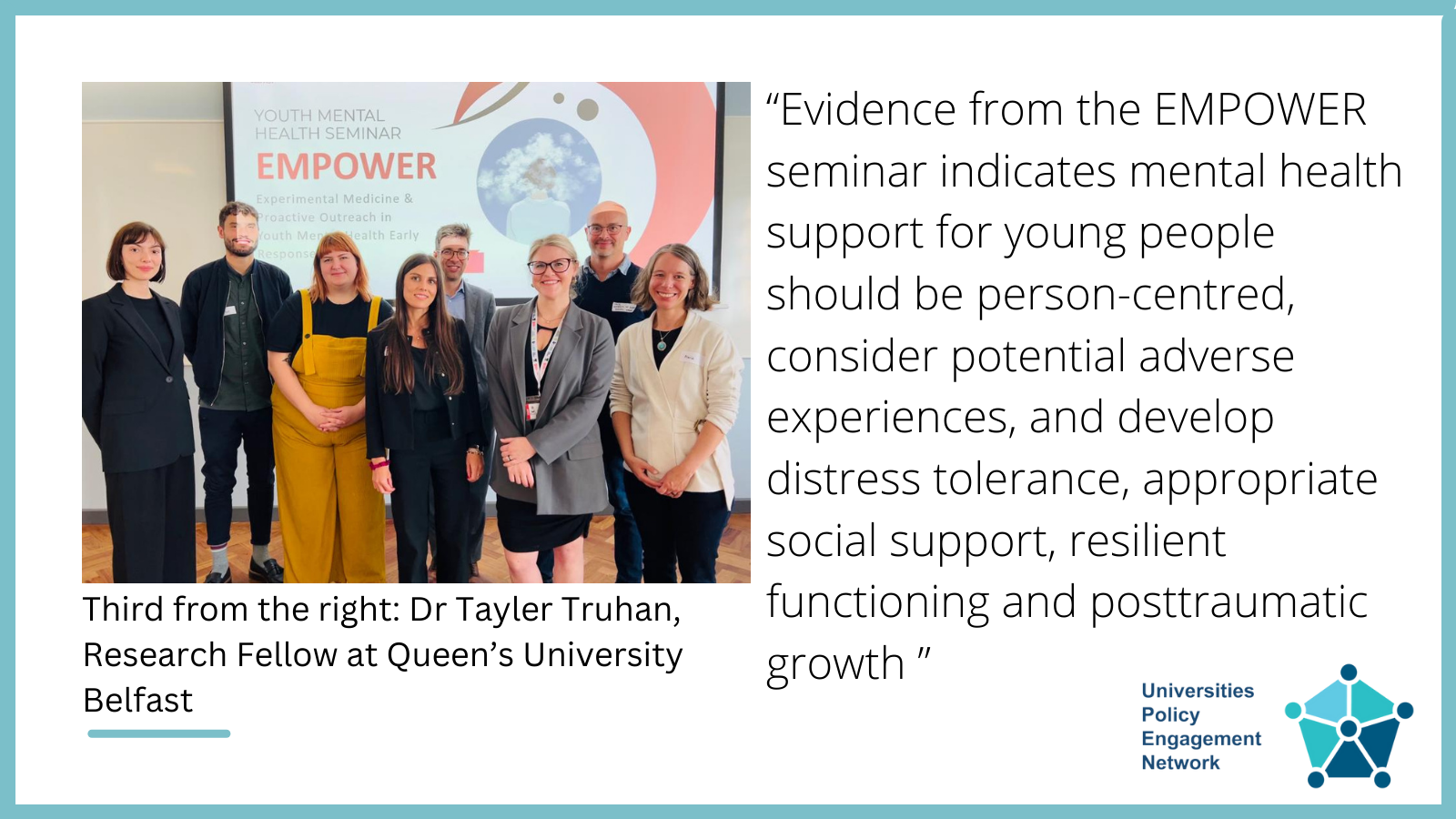Lessons learned from the EMPOWER Youth Mental Health seminar

On the 25th August, 2023 we held the EMPOWER seminar at Queen’s University Belfast focusing on youth mental health. My colleagues, Dr. Arianna Prudenzi (Principal Investigator) and Dr. Paul Shuttleworth, and I started the Experimental Medicine & Proactive Outreach in Youth Mental Health (EMPOWER) project to address a Department of Health and Social Care (DHSC) 2023 research priority: 'early action to prevent poor health outcomes', specifically focusing on youth mental health. Overall, the EMPOWER project will culminate in a policy brief which will be shared with policy makers, including the DHSC. The seminar was included as part of the EMPOWER project to discuss challenges, opportunities, and best practices in early intervention and prevention strategies across disciplines.
Mental health support for young people should be person-centred
Dr. Paul Shuttleworth, University of Sussex, highlighted that it’s important to consider what young people Value, or ‘what matters’ to them, regarding mental health support and intervention. Our youth focus group identified values relating to mental health support of: Holistic Care, Collaboration, and Diversity.
Mairéad McCafferty from NICCY presented the NICCY - ‘Still Waiting’: Rights Based Review of Mental Health Services for Children and Young People. This review incorporated the views of young people, some of whom were not able to get the right mental health support and suffered long wait times. Some were not given a choice about what mental health service they can access and did not find the service helpful.
Nathan Catterson and Bianca Gheorghe from Belfast Central Mission presented a framework for encouraging independence in youth in care, by adopting a person-centred approach which incorporates the young person into all aspects of the services they receive (e.g., Where I live, What I do, My support, How I feel…). Currently in Northern Ireland, the amount of young people moving on from Supported Housing into housing executive/housing association tenancies has drastically reduced. Some young people are getting support with Supported Housing for two years, making important life progress, and then move on options are to hostels/foyers/other supported type accommodation, which can feel like a backwards step.
Experiences of adversity or maltreatment need to be considered
Professor Cherie Armour, Queen’s University Belfast, pointed out that adverse childhood experiences effect about 30% of people in the UK, and rates of domestic abuse are increasing each year in Northern Ireland. Resilience, social support and distress tolerance can reduce the likelihood of experiencing a mental health problem after adversity.
Further, Dr. Maria Dauvermann, University of Birmingham, told us that brain function and connectivity can influence how adverse childhood experiences impact mental health outcomes. GABA concentrations and Default-mode network connectivity may be particularly important. DMPFC activation may reflect a more positive cognitive re-appraisal process of adverse experiences.
Pathways to better mental health outcomes
Dr. Gerald Jordan, University of Birmingham showed us that young people can experience posttraumatic growth following a severe mental health problem, such as first episode psychosis. Receiving formal mental health services and drawing on personal and social (e.g., community) resources and strategies predicted healing and recovery and posttraumatic growth.
Dr. Arianna Prudenzi presented Acceptance and Commitment Therapy in the workplace for young workers (age 18-29), which can reduce psychological distress and burnout.
More training for staff and sharing of resources is needed
In the ‘Still Waiting’ report from NICCY, it was also highlighted that mental health service providers did not understand learning disabilities, drug and alcohol problems, etc.
Actions for the government – early intervention is key!
We need to listen to young people’s experiences of mental health services, and what they value in mental health support. Young people should be able to choose type of mental health support, and this should include choices other than medication. More money needs to be allocated for mental health services to decrease wait times. Dr. Tayler Truhan suggested that incorporating initial personality assessments would contribute to tailoring mental health support to the individual.
Adults working with young people, including A&E staff, doctors, nurses, teachers, social workers, need more mental health training. More information should be recorded about mental health, and information and resources should be shared between services. Further, clinicians can provide gentle encouragement, narrative reconstruction, be open to different explanatory models, and encourage the use of spiritual/religious resources when appropriate to promote growth after experiencing a mental health problem, such as psychosis.
There are intergenerational effects of trauma. We can break this cycle through early intervention, and by supporting more resilient functioning.
Regarding youth in supported housing, additional points above and beyond the 'priority needs' points for care leavers would give them an extra chance at getting their own accommodation.










































































































